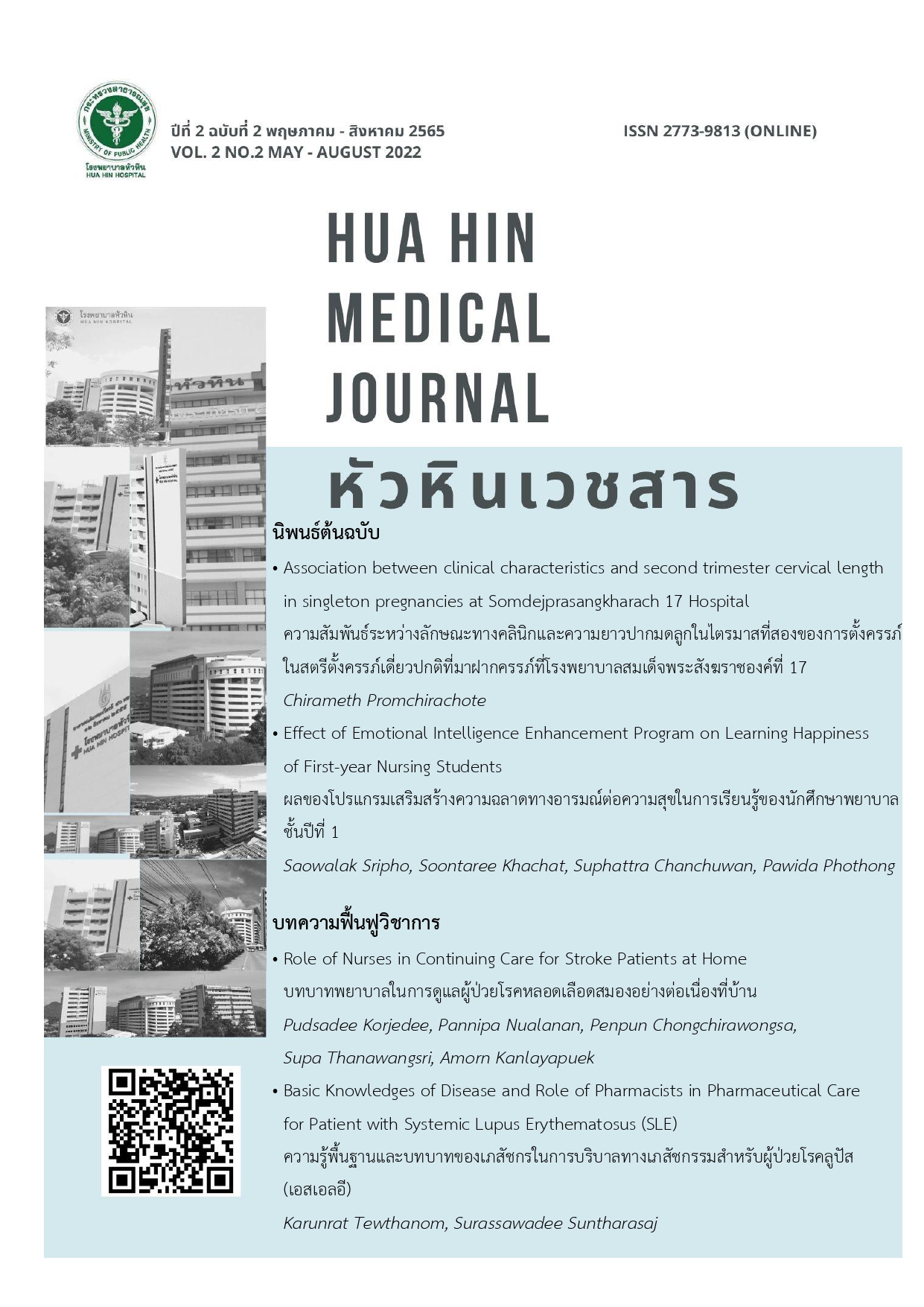Effect of Emotional Intelligence Enhancement Program on Learning Happiness of First-year Nursing Students
Keywords:
emotional intelligence, learning happiness, nursing studentsAbstract
Background: Emotional intelligence is an internal factor that is not genetic. But it can be developed. Nursing students should be encouraged to develop emotional intelligence to support their learning and living.
Objective: To study the effect of an emotional intelligence enhancement program on learning happiness among first-year nursing students.
Methods: Quasi-experimental research. The sample group consisted of 50 nursing students randomly assigned to the experimental and the control group of 25 people each. The experimental group received the Emotional Intelligent enhancement program consisting of group activities twice a week, totaling eight times. The control group received regular care. Data were collected using the happiness in learning assessment form. Cronbach’s alpha coefficient was 0.84. The data were analyzed using percentage, mean, standard deviation, Independent t-test.
Results: The results showed that The mean learning happiness scores of the experimental group who received the emotional intelligence enhancement program were higher than before the experiment and were better than the control group statistically significant (p< .01).
Conclusion: The emotional intelligence enhancement program affects the learning happiness of first-year nursing students, which nursing institutions can use as a guideline to encourage students to continue learning.
References
พรรณภา เรืองกิจ, สนธยา มณีรัตน์, เยาวลักษณ์ มีบุญมาก. การศึกษาความสัมพันธ์ระหว่าง ภาวะสุขภาพจิตและความเครียดของ นักศึกษาพยาบาล วิทยาลัยพยาบาลบรม ราชชนนี นพรัตน์วชิระ. วารสาร มหาวิทยาลัยศิลปากร 2562;12(1): 1208 – 1224.
อ้อยทิพย์ บัวจันทร์, ธมลวรรณ สวัสดิ์สิงห์, ณัฐปภัสญ์ นวลสีทอง และเทพไทย โชติชัย. ความแข็งแกร่งในชีวิตและความเครียดของ นักศึกษาพยาบาลชั้นปีที่ 1 คณะพยาบาล ศาสตร์ มหาวิทยาลัยราชภัฏชัยภูมิ. วารสาร บัณฑิตศึกษามหาจุฬาขอนแก่น 2562; 6(4): 257-269.
นฤมล สมรรคเสวี, โสภิณ แสงอ่อน. ปัจจัยที่ สัมพันธ์กับภาวะซึมเศร้าในนักศึกษา พยาบาล. วารสารการพยาบาลจิตเวชและ สุขภาพจิต 2558; 29(3): 11-27.
ณัฐิกา ราชบุตร, จุลจีรา จันทะมุงคุณ, ลำพงษ์ ศรีวงษ์ชัย, ธรณินทร์ คุณแขวน. ผลของ โปรแกรมออกกำลังกายเชิงประยุกต์ต่อการ ป้องกันปัญหาสุขภาพจิตของนักศึกษา พยาบาลมหาวิทยาลัยราชภัฏชัยภูมิ. วารสาร โรงพยาบาลสกลนคร 2562; 22(1): 76-85.
ธนพล บรรดาศักดิ์, กนกอร ชาวเวียง และนฤมล จันทรเกษม. (2560). ความสุขในการเรียนรู้ ของนักศึกษาพยาบาล. วารสารสันติศึกษา ปริทรรศน์ มจร, 5(1), 357 – 369.
ปัทมา ทองสม. การพัฒนาดัชนีชี้วัด ความสุขใน การเรียนของนักศึกษาหลักสูตรพยาบาล ศาสตรบัณฑิต สังกัดกระทรวง สาธารณสุข. วารสารการพยาบาลการศึกษา 2554; 4(1): 88-110.
ธนพล บรรดาศักดิ์, ชนัดดา แนบเกษร, ดวงใจ วัฒนสินธุ์. ผลของโปรแกรมการ เสริมสร้างความแข็งแกร่งในชีวิตต่อ ความสุขในการเรียนรู้ของนักศึกษา พยาบาล. วารสารสันติศึกษาปริทรรศน์ มจร 2560; 5(3): 195 – 208.
จิณฑ์จุฑา ชัยเสนา ดาลลาส, สายใจ พัวพันธ์, ดวงใจ วัฒนสินธ์. ปัจจัยที่มี อิทธิพลต่อภาวะสุขภาพจิตของนักศึกษา พยาบาล. วารสารคณะพยาบาลศาสตร์ มหาวิทยาลัยบูรพา 2558; 23(3): 1-13.
ลัดดา แสนสีหา, เลอลักษณ์ แทนเกษม, ถิรนันท์ พัวพันธ์พงศ์. ปัจจัยความฉลาดทาง อารมณ์ที่มีผลต่อความแข็งแกร่งในชีวิตของ นิสิตพยาบาลคณะพยาบาลศาสตร์ มหาวิทยาลัยมหาสารคาม. วารสารการ พยาบาลและการดูแลสุขภาพ 2561; 36(4): 186-194.
Goleman D. Emotional Intellgence: Issues in Paradigm Building. In C. Cherniss & D. Goleman (Eds.), The Emotionally Intelligent Workplace. San Francisco, CA: Jossey – Bass 2001; 13-26.
Thomas D, Natarajan J. Emotional Intelligence among Nursing students – An Integrated Review. Journal of Nursing and Health Science 2017; 6(1): 81-89.
Holston EC, Taylor JY. Emotional Intelligence in Nursing Students Describing Emotional Intelligence in the Last 2 Years of a BSN Program, International Journal of Advances in Psychology 2016; 5: 11-22.
ดวงใจ วัฒนสินธุ์ และสิริพิมพ์ ชูปาน. ปัจจัย ทำนายความฉลาดทางสังคมของนักศึกษา พยาบาล. วารสารการพยาบาลและ การศึกษา 2562; 12(1): 72 – 87.
Polit DF, Hungler BP. Nursing Research: Principle and Methods (4th ed.). Philadelphia: J. B. Lippincott; 1995.
Erkayiran O, Demirkiran F. The Impact of Improving Emotional Intelligence Skills Training on Nursing Students’ Interpersonal Relationship Styles: A Quasi- experimental Study, International Journal of Caring Sciences 2018; 11(3): 1901-1912.
ปรีดานันต์ ประสิทธิ์เวช, ผุสดี สระทอง, สรัลรัตน์ พลอินทร์, ดวงหทัย ยอดทอง.ผล ของการจัดการเรียนรู้สู่การเปลี่ยนแปลง ต่อ ความฉลาดทางอารมณ์ ของนักศึกษา พยาบาลศาสตร์ชั้นปีที่ 3 วิชาปฏิบัติการ พยาบาลบุคคลที่มีปัญหาทางสุขภาพจิต. วารสารวิจัยและนวัตกรรมทางสุขภาพ 2562; 2(1): 73 – 86.
วิลัยพร นุชสุธรรม, พัชราวรรรณ แก้วกันทะ, ลาวัลย์ สมบูรณ์, ชมภู่ บุญไทย, สุกัญญา เมืองมาคำ ผลของโปรแกรมสร้าง เสริมความฉลาดทางอารมณ์ ต่อความฉลาด ทางอารมณ์ของนักศึกษาพยาบาล. พยาบาลสาร 2561; 45(1): 110-121.
Downloads
Published
How to Cite
Issue
Section
License
Copyright (c) 2022 Hua-Hin Hospital

This work is licensed under a Creative Commons Attribution-NonCommercial-NoDerivatives 4.0 International License.
บทความที่ได้รับการตีพิมพ์ในวารสารหัวหินเวชสาร เป็นลิขสิทธิ์ของโรงพยาบาลหัวหิน
บทความที่ลงพิมพ์ใน วารสารหัวหินเวชสาร ถือว่าเป็นความเห็นส่วนตัวของผู้เขียนคณะบรรณาธิการไม่จำเป็นต้องเห็นด้วย ผู้เขียนต้องรับผิดชอบต่อบทความของตนเอง







